Psychology
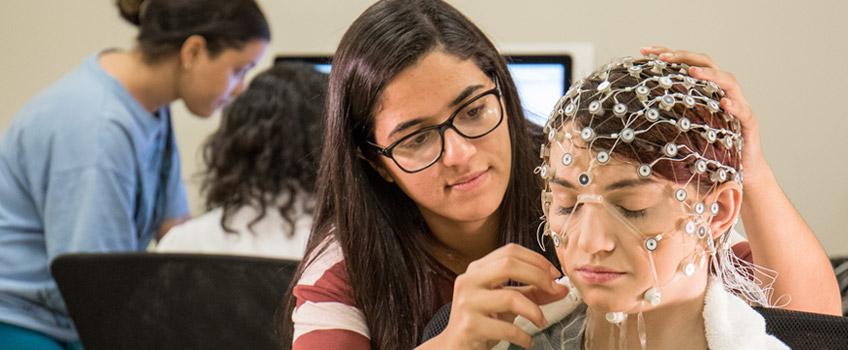
Psychology Research

Developmental Psychology
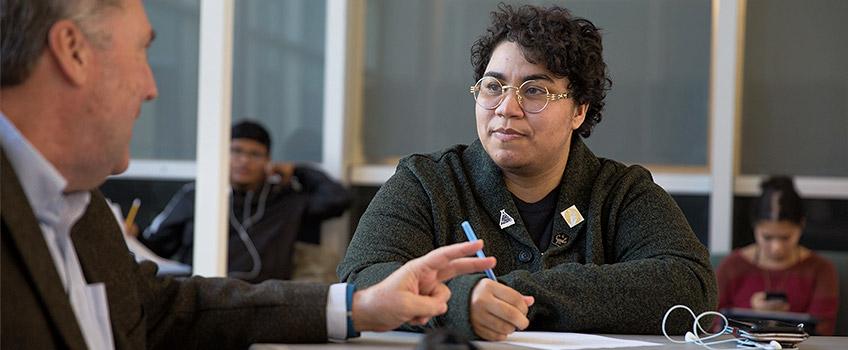
Clinical Psychology
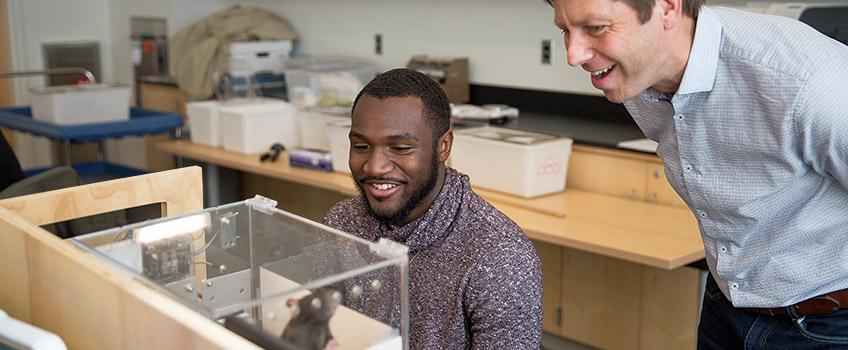
Learning Laboratory
Psychology is the systematic study of behavior and experience.
Psychology explores why humans and non-humans behave the way they do and the source of their behaviors. We study the behaviors of humans, from child development to older adulthood. We also study the behavior of animals.
Psychologists are interested in the biological contributors to behaviors from the brain and nervous system, and the contributions of the environment that stem from family, friends, and other social factors.
About the Psychology Program
If you like studying people and seek to understand why they behave the way they do and what their experience is like, then you may enjoy psychology.
Knowledge from psychological theory and research can help us to understand the world better, and to gain insight into how we can live healthier more productive lives. Psychology focuses on understanding how the brain and the environment contribute to behavior. Because psychology is a science, you will learn analytical skills and how to evaluate research. The psychology degree at Stockton offers many applied experiences, such as research opportunities and internships, to help students prepare for the next level.
The psychology major prepares students to work under supervision when providing psychological services and also prepares students for business, law school, research, teacher certification, and more.
Program Chair

Mark Berg, Ph.D.
Associate Professor of Psychology
609-626-6862
G266
mark.berg@stockton.edu
Curriculum
Overview
Three basic courses, required of all majors, provide a foundation for the understanding of psychology:
-
PSYC 1100 Introduction to Psychology
-
PSYC 2241 Statistical Methods
-
PSYC 3242 Experimental Psychology
Students must also select courses from two core areas of the discipline:
-
Natural Science Core (Group 1)
-
Social Science Core (Group 2)
Juniors and seniors have the opportunity to work closely with faculty members in seminars, tutorials and independent studies, which require students to be active, responsible participants while examining various theoretical, empirical, and applied topics.
-
Seminars always involve regular class meetings and discussion
-
Research tutorials are often more flexible with less structured class time and more independent investigation and inquiry.
-
Field placements allow students to apply what they have learned in their courses and gain experience working in educational, social services, and other professional settings.
Concentrations
Psychology students are not required to pursue a concentration, but they may choose to focus on a particular area of interest. The program offers the following concentrations:
Students seeking teacher certification must meet both the requirements for graduation in Psychology and the state requirements for teacher certification (including testing and clinical practice requirements).
Elementary Education:
Required PSYC courses (in addition to required core courses):
- PSYC 3323 Developmental PSYC: Childhood & Adolescence (required Natural Science)
- PSYC 3391 Educational PSYC (replaces one PSYC elective)
Required Cognates:
- EDUC 1515 Diversity in Families, Schools & Communities (4 credits)
- EDUC 2241 Inclusive Learning in Education (4 credits)
- EDUC 3101 Part time Clinical Practice I (2 credits)
- EDUC 4600 Part time Clinical Practice II (2 credits)
- EDUC 4990 Full time Final Clinical Practice (12 credits)
- EDUC 4991 Final Clinical Practice Seminar (2 credits)
Required At Some Distance:
- EDUC 2000 Gateway to the NJ Teaching Profession (1 credit)
- EDUC 3105 Literacy Development (3 credits)
- EDUC 3200 Practices and Techniques of Teaching (4 credits)
- EDUC 4110 Methods of Teaching English Language Arts (2 credits)
- EDUC 4150 Methods of Teaching Elementary Math (2 credits)
- EDUC 4610 Curriculum & Methods in Elementary Education (3 credits)
- EDUC 4992 EdTPA Capstone (2 credits)
Early Childhood Education:
Required PSYC course (in addition to required core courses):
- PSYC 3391 Educational PSYC (replaces one PSYC elective)
Required Cognates:
- LANG 1210 Beginning American Sign Language I (4 credits)
- HLTH 2115 Language Development (4 credits)
- EDUC 3101 Part time Clinical Practice I (2 credits)
- EDUC 4600 Part time Clinical Practice II (2 credits)
- EDUC 4990 Full time Final Clinical Practice (12 credits)
- EDUC 4991 Final Clinical Practice Seminar (2 credits)
Required At Some Distance:
- EDUC 2000 Gateway to the NJ Teaching Profession (1 credit)
- EDUC 3105 Literacy Development (3 credits)
- ECUC 3151 Language & Motor Development (3 credits)
- EDUC 3200 Practices and Techniques of Teaching (4 credits)
- EDUC 4151 Curriculum Instruction & Assessment P-3 (3 credits)
- EDUC 4612 Interdisciplinary Studies w/Early Childhood Education (4 credits)
- EDUC 4610 Curriculum & Methods in Elementary Education (3 credits)
- EDUC 4992 EdTPA Capstone (2 credits)
*Please refer to Degree Works for additional requirements and course options.
This concentration provides a structured curriculum for those students who are interested in pursuing a research-focused graduate education in psychology or a closely related discipline. Students will develop their ability to read, comprehend and critically evaluate primary research articles. They will also receive systematic training which will enable them to conduct research projects independently. Students will be required to complete two courses focusing on statistical analysis techniques, one seminar course that heavily requires the reading of primary research articles, multiple research projects, and at least one formal experience in disseminating research findings to professional researchers. Completing this concentration would strengthen students’ graduate school applications and improve their chances of being accepted into competitive graduate programs. The structure of this concentration is flexible enough that students (including transfers) could complete it in two years; it is open to both B.A. and B.S. students.
The following courses (16 credit minimum) will fulfill the requirements of the concentration:
PSYC 3641 Advanced Statistics (elective for BA, required for BS)
PSYC 36XX Additional Senior Seminar (elective for BA, required for BS) [PSYC 3641 may not be used to fill this requirement]
Two Research Courses from below (8 credits):
- PSYC 27xx Research Practicum (elective for BA/BS)
- PSYC 37xx Research Tutorial (can be senior seminar for BA/BS)
- PSYC 3740 Data Analysis Practicum
- PSYC 4810 Research-based independent study (elective for BA/BS)
- PSYC 4815 Research-based independent study in neuroscience
- PSYC 4895 SIRE course in neuroscience (elective for BA/BS)
- PSYC 4899 SIRE course (elective for BA/BS)
Completion of at least one of the following (0-4 credits):
- PSYC 4820 Project for Distinction
- Author (or co-author) of Regional, National or International Conference Presentation
- Author (or co-author) of Peer-Reviewed Publication
Forensic psychology is a rapidly growing field within psychology and criminal justice. Courses that comprise the concentration at Stockton University were selected so students will understand an overall relationship between psychological principles and criminal offending. The criminal offender is continually influenced by multiple systems within the psychosocial environment. By taking the courses in the forensic psychology concentration, students will synthesize selected components in criminal justice and psychology that will result in a better understanding of how developmental patterns result in criminal behavior. Students will develop insight into how criminals think relative to the choices they make. These courses are also designed to allow a student to continue easily studying forensic psychology in the Master of Arts in Criminal Justice program at Stockton, to continue studying in a psychology master’s degree program in another institution of higher education, or to pursue a variety of career opportunities. Criminal Justice and Psychology majors may enroll in the Forensic Psychology concentration at any time.
Foundation course requirements (Note: PSYC 1100 and CRIM 1100 are prerequisites to these courses):
- CRIM 2114 Theories of Criminality
- PSYC 2211 Psychopathology
- CRIM/PSYC 3120 Forensic Psychology
Electives (two of the following courses):
- CRIM 2111 Juvenile Justice
- CRIM 2327 Introduction to Victimology
- CRIM 2610 Introduction to Forensic Science
- CRIM 3625 Sex and Violence
- PSYC 3145 Sex Crimes
- PSYC 3646 Forensic Behavior Analysis
- PSYC 3648 The Criminal Brain
- PSYC 3618 The Psychology of Child Victims and Witnesses
This concentration provides students with a framework to develop a general understanding of the diagnosis and treatment of clinical populations, the structure and functioning of the mental health system, and the basic skills necessary for interacting professionally in human service contexts.
Foundation course requirements:
- PSYC 1100 Introduction to Psychology
- PSYC 2211 Psychopathology
- PSYC 3392 Theories of Counseling
Electives (four of the following courses):
- PSYC 3145 Sex Crimes
- PSYC 3323 Developmental Psychology: Childhood and Adolescence
- PSYC 3324 Psychology of Learning
- PSYC 3355 Clinical Neuropsychology
- PSYC 3398 Theories of Counseling II
- PSYC 3605 Psychology of Eating Disorders
- PSYC 3610 Depression
- PSYC 3616 Aging and Mental Health
- PSYC 3619 Psychology of Group Therapy
- PSYC 3626 Couples and Family Therapy
- PSYC 3635 Positive Psychology
- PSYC 3646 Forensic Behavior Analysis
- PSYC 3648 The Criminal Brain
- PSYC 3900 Field Placement in Psychology*
- PSYC 3904 Field Placement in Childhood Studies*
- GAH 3616 Memoirs of Mental Illness
- GERO Gerontology Internship*
- GIS 3319 Addictions
- GSS 2612 Multiple Perspectives on Suicide
- GSS 3612 Culture and Mental Health
* The field placement (PSYC 3900, PSYC 3904, or GERO 3900) can take the place of TWO electives if approved by the faculty member sponsoring the courses. Students should be aware that they may need to secure their own placement.
Minors
Psychology students are encouraged to explore various minors that provide complementary knowledge to the psychology degree. These offerings include:
- Behavioral Neuroscience minor
- Childhood Studies minor
- Integrative Health minor
- Gerontology minor
- Victimology minor
- Women’s Gender and Sexuality minor
Curriculum Sheets & Degree Maps
CURRICULUM WORKSHEETS
DEGREE MAPS: BACHELOR OF ARTS IN PSYCHOLOGY
PSYC BA Degree Maps: All Concentrations
DEGREE MAPS: BACHELOR OF SCIENCE IN PSYCHOLOGY
PSYC BS Degree Maps: All Concentrations
Student Learning Outcomes
Our program's student learning outcomes are tied to 5 Learning Goals:
-
Knowlege Base
-
Scientific Inquiry and Critical Thinking
-
Ethical and Social Responsibility in a Diverse World
-
Communication
-
Professional Development
These goals are adopted from the APA Guidelines for the Undergraduate Psychology Major, and are accomplished by completing the courses in our program, both required and elected.
Psychology Program Faculty

Mark E. Berg

John Bulevich

Christine V. Ferri

Jessica Fleck

Christine A. Gayda-Chelder

Helana Girgis

Zornitsa Kalibatseva

Colleen Kase

Jennifer A. Lyke

Justin Ostrofsky

Nordia Scott

Elizabeth Shobe

Marcello Spinella

Connie M. Tang

John H. White

Keith B. Williams

Hannah Wolfe

Kaite Yang
Associated Faculty

David Rosen
Professors Emeriti

David C. Burdick

Michael L. Frank

Sonia V. Gonsalves

Cheryl R. Kaus
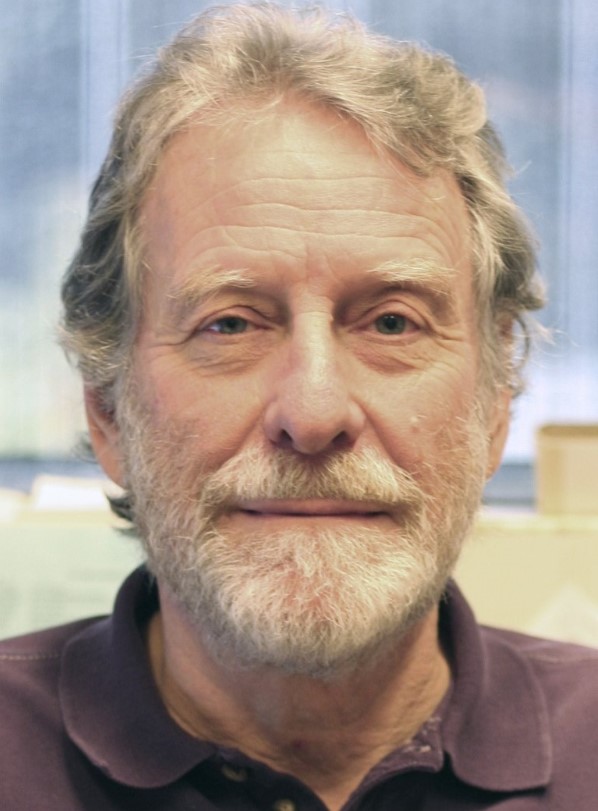
David Lester

Jean Mercer

William M. Miley
Faculty & Student Research
Faculty & Student Research
The psychology program provides numerous opportunities for students to become involved in research. Many research students have the opportunity to present their research findings at a scientific conference, or to coauthor a manuscript in a scholarly journal. Some of the experiences available to our students include:
- Research courses in which students complete a research project as the main focus of the course. These typically occur as research tutorial courses or summer intensive research experiences.
- Research assistants on faculty-directed research projects. Students assist faculty with data collection and analysis on faculty research projects.
- Projects for distinction. These are student-directed research projects that are completed under faculty supervision.
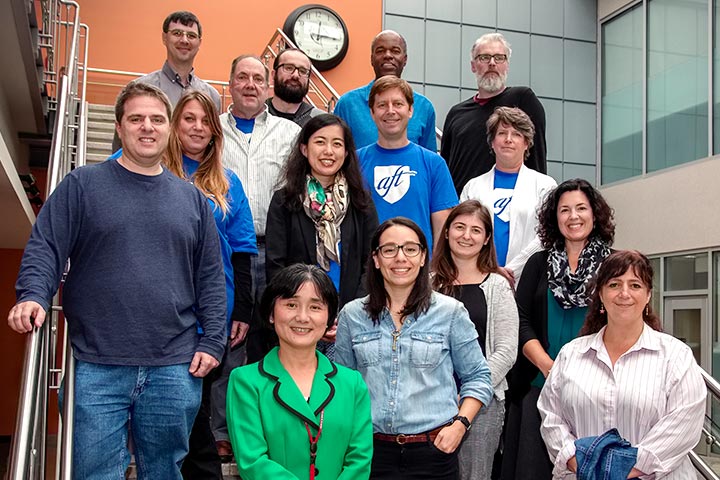
Students interested in learning more about how to acquire psychology research experience should visit the Psychology Research Resources website. Example website content includes:
- Benefits of Acquiring Undergraduate Research Experience
- Ways to Acquire Undergraduate Research Experience
- Psychology Program Faculty Members Who Conduct Research with Students
- Detailed Information about Conducting Projects for Distinction
- Detailed Information about the Empirical Research Concentration and research courses
- Information about how to Find Research Jobs and Summer Research Programs for Undergraduates or Students who have Graduated with a Bachelors Degree
- Detailed Information about Creating a Psychology Student Research Portfolio
For current students:
Internship Experience
Students interested in learning more about how to acquire internship experience relating to psychology, childhood studies and/or gerontology should visit the Psychology Internship Resources website. On this website, you will find detailed information pertaining to:
- Field Placement Courses in Psychology, Childhood Studies and Gerontology
- Faculty Members who Supervise PSYC/GERO Field Placement Courses
- Types of Internship Sites Students Can Work at in their Field Placement Course
- Type of Work Student Interns Complete in their Field Placement Course
- How to Get Involved in a Field Placement Course: How to Secure an Internship and What to do Before it Begins
- Student Responsibilities During the Semester of their Field Placement Course/Internship
Student Engagement
The Psychology program at Stockton has an active Psychology Club as well as a chapter of Psi Chi, the National Honor Society in Psychology.
Psychology Club
The club enhances student learning and the community by:
- organizing faculty, graduate school, alumni, and career panels
- hosting psychology and graduate school information sessions
- coordinating volunteer and donation drives
- facilitating other psychology-related events and activities, including an annual day trip to locations such as the Eastern State Penitentiary and the Philadelphia College of Physicians (Mutter Museum).
The club participates in the selection of the Distinguished Psychology Alumni Award and provides assistance with the annual Stockton Psychology Undergraduate Research Conference.
The 2025-2026 executive board consists of:
- President: Sydney Roach
- Vice president & Treasurer: Alberto Jacamo
- Public Relations: Arianna Donges
- Secretary: Geona Singh
- Event Coordinator: Anastasia Ziegler
For more information, please contact the faculty advisor, Dr. Colleen Kase, at colleen.kase@stockton.edu or visit OspreyHub.
Psi Chi
Psi Chi was founded in 1929 for the purposes of encouraging, stimulating, and maintaining
excellence in scholarship, and advancing the science of psychology. Here at Stockton,
our chapter hosts research conferences, career panels, service projects, and many
other activities.
For more information please visit the Stockton Psi Chi website.
- completed at least one semester of full time course work at Stockton (including 9 credit hours in psychology)
- registered as a Psychology major
- maintained an overall GPA of at least 3.6 and a PSYC GPA of at least 3.6 for work completed at Stockton University.
Graduate Study and Careers
The psychology degree prepares you for many careers. Some of these careers are professional areas of psychology such as clinical/counseling psychologist, health psychologist, experimental/research psychologist, developmental psychologist, and many others. There are also careers in related fields in which training in psychology will give you an advantage. Related areas where the psychology degree is beneficial include hospital administration, marketing, international relations, publication relations, sales, education, health and medical professions, and many more.
Careers in Psychology
- American Psychological Association's (APA’s) Career Guides
- APA's A Summary of Psychologist Workforce Projections: Addressing Supply and Demand from 2015-2030
- Online Career-exploration Resource for Psychology Majors
- Pursuing Psychology Careers Page
- The Occupational Outlook Handbook
Obtaining a Research Assistant Position Following Graduation
Graduate Study in Psychology
- Preparing to Apply to Graduate School in Psychology – A Reference for Students
- Preparing to Take the Graduate Record Exam (GRE)
- APA’s Guide to Identifying Graduate Programs in Psychology. This resource is published annually and provides listing of programs by content area and region.
- Graduate Study in Psychology
- Master’s Programs in Professional Counseling
- Accredited doctoral programs in Psychology


